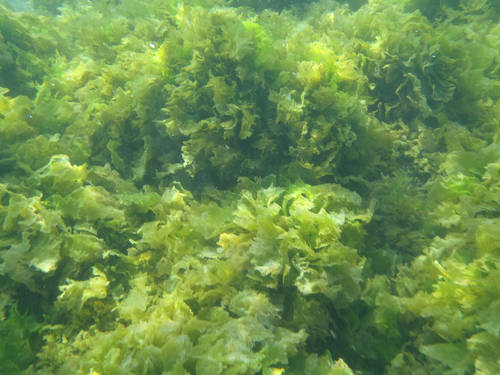
Jump to
Short answer
Marine Phytoplankton are single cell living organisms that support life in the ocean. They are sometimes referred to as “micro-algae.” They are touted as the “Whole Food of the Ocean" and when ingested can supply our bodies with many nutrients that support our vital organs and cells. Marine Phytoplankton has Vitamin K so individuals on blood thinning medications need to consult with their physician.
Long answer
Marine Phytoplankton (MP) appears to be the oldest whole food of the ocean that is considered by many scientists to be the newest food of mankind. Over the years, NASA has been studying the benefits of MP. We do know that MP is responsible for life in the ocean. It is the basis of the aquatic food chain and microscopic organisms, as well as multi-ton whales, enjoy this nutrient dense food. MP has the capability of photosynthesis and is possibly responsible for over 90% of our earth’s oxygen. Over the years researchers have felt that MP would be a good whole food for supplementation. Here is one of the areas that MP may help.
The Problem:
Nutritional depletion and toxicity
In today’s society, our foods may not be giving us the nutrients that we require.
Many foods today are:
-Chemically altered
-Genetically modified
-Filled with preservatives
-Polluted with pesticides, insecticides, herbicides, hormones, steroids and antibiotics
-Void of minerals and vitamins due to stripping of our farmlands
Impurities (toxins) can enter our body when we breathe polluted air, drink polluted water and eat foods laden with chemicals. Impurities in our body are clinically linked to:
-Inflammatory and degenerative diseases
-Autoimmune diseases
-Metabolic Syndrome that includes Type II diabetes, increased cholesterol and triglyceride levels and obesity
-Increased cardiovascular and pulmonary diseases
-Liver diseases
-Multiple cancers including breast, lung, pancreatic, esophageal, colon and thyroid
-Fatigue and disrupted sleep cycles
Our fast passed lives and chemically altered foods can leave our vital organs and cells starving for nutrition.
Concentrated MP can provide our cells with:
-Amino acids (building blocks of proteins)
-A full spectrum of minerals, trace minerals and vitamins
-Omega 3 and 6 Essential fatty acids
-Antioxidants (to help with toxicity)
-Phospholipids for cell membrane strength
MP should not replace a healthy diet but may be a helpful supplement to increase the amount of nutrition that is needed in our cells and vital organs.
Side Effects
Although no significant side effects have been reported with MP - as with any supplement you should clear it with your healthcare professional if you are on any medications or have any restrictions with your diet.
Because there is Vitamin K in MP, individuals on blood thinning meds should be monitored accordingly.
Because our oceans are unfortunately polluted with toxins and sometimes radioactivity, here is what you should look for in a company when picking out an MP supplement.
-MP has a silica shell that needs to be removed so that the human body can digest the MP properly
–The silica shell wall needs to be gently removed to provide 100% cellular bioavailability
-There should be no disruption of the dense nutrients when the silica shell is removed
-The best companies have friendly production of MP with a positive carbon footprint for the ocean and its sea life
-A superior company will supply multiple species of plankton that is grown outdoors in natural environmental conditions (known as creating “natural blooms’)
- And obviously find a company that tests for bacteria, heavy metals, mold and radioactivity before packaging MP for human consumption
Benefits
There are various health benefits that can be obtained from using this whole food from the sea.
- Supporting Cardiovascular Health: The high level of antioxidants, amino acids, and high levels of omega-3 fatty acids are known to support a healthier cardiovascular system.
- Promoting Healthy Skin: There are large amounts of bioflavonoids that can help remove impurities from skin cells.
- Supporting Healthy Cholesterol levels: Niacin, gamma linolenic acid and omega-3 fatty acids help to maintain healthy cholesterol levels.
- Supporting a Healthy Immune System: Alanine, beta-carotene, bioflavonoids, and vitamin E all support a healthy immune system.
- Helping to Boost Energy: Riboflavin breaks down proteins, fats, and carbohydrates, and helps produce energy. Vitamin B12 energizes the body.
- Supporting Healthy Glucose Levels. Chromium has been shown in many clinical studies to help with stabilizing glucose levels. Studies on Glutamic acids demonstrate that this nutrient can reduce alcohol and sugar cravings along with phenylalanine which is also recognized as a sugar craving reducer.
- Supporting Visual Acuity: Beta-carotene helps support visual function.
- Supporting Healthy Joints: Manganese, Omega 6 fatty acids, and Pantothenic acid help to assist in joint mobility.
- Supporting a Healthy Liver: The arginine along with several other trace minerals and vitamins supports healthy liver function. Your liver is your number one detoxification organ of the body. And because we are all surrounded by toxins we need to support optimal liver function.
- Supporting Mental Acuity and Healthy Brain Chemistry: The high amount of omega-3 fatty acids supports brain function. The nucleic acids can help maintain the memory. Phenylalanine supports mental clarity. Proline maintains learning ability. Magnesium helps support a healthy mood.
- Supporting Digestion, Absorption and Elimination: Trace minerals support absorption of other important nutrients.
- Supporting development of lean dense muscle: Amino acids are the building blocks of protein and support the building of muscle. Glycogen also maintains overall physical stamina so that the body can produce more muscle.
- Maintaining antioxidant levels. Antioxidants fight off the adverse effects of free radicals that can damage cells and cellular DNA.

 Approved by
Approved by 














